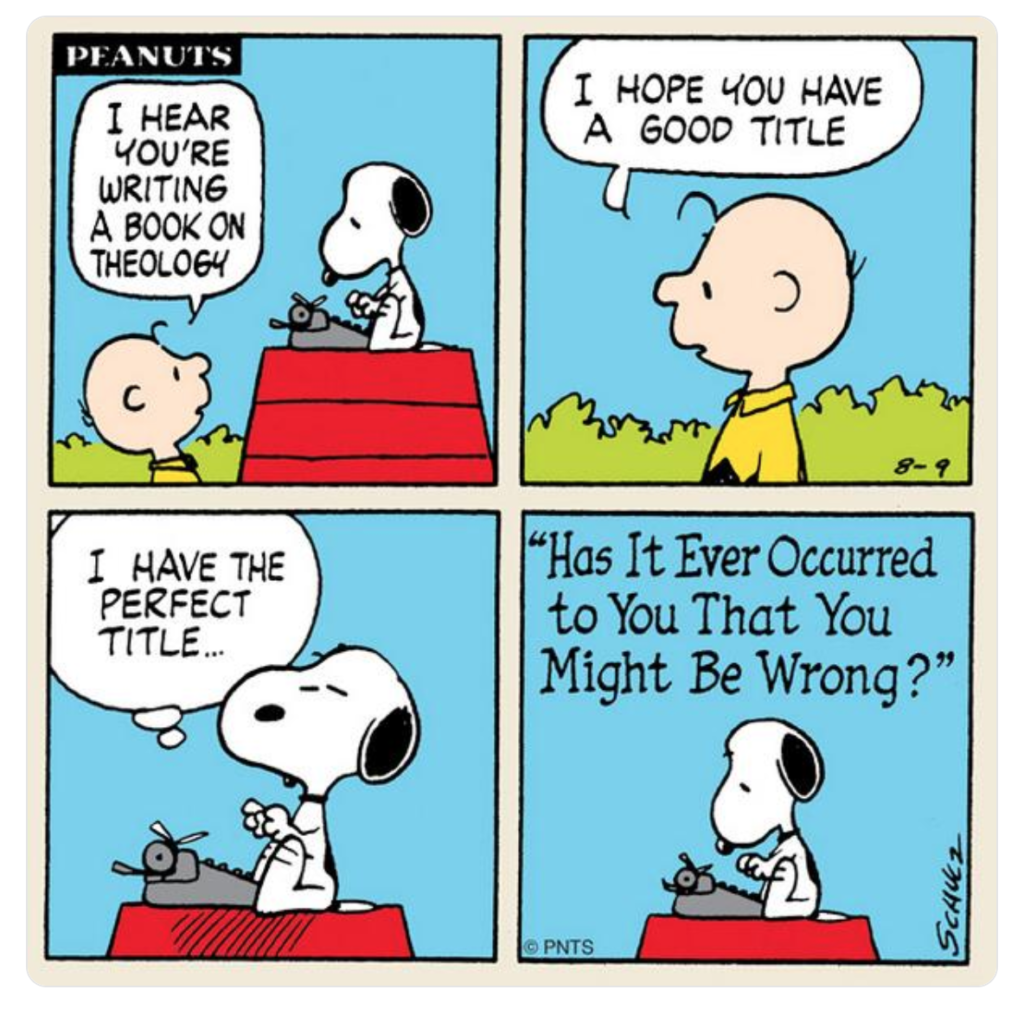
Cartooning is preaching. And I think we have a right to do some preaching. I hate shallow humor. I hate shallow religious humor, I hate shallow sports humor, I hate shallowness of any kind.
Charles M. Schulz
People of Zion, who live in Jerusalem, you will weep no more. How gracious he will be when you cry for help! As soon as he hears, he will answer you. Although the Lord gives you the bread of adversity and the water of affliction, your teachers will be hidden no more; with your own eyes you will see them. Whether you turn to the right or to the left, your ears will hear a voice behind you, saying, “This is the way; walk in it.”
Isaiah 30:19-21
For now we see only a reflection as in a mirror; then we shall see face to face. Now I know in part; then I shall know fully, even as I am fully known. And now these three remain: faith, hope and love. But the greatest of these is love.
I Corinthians 13:12-13
The Gospel According to Snoopy
Last week, I was asked to give a presentation on how my goofy cartoons and my faith intersect. It’s fun for me to think about, and I’ve given a talk like this a few times, always being led back to my hero, Charles Schulz, to whom is attributed the above quote about cartooning as preaching.
I had always admired him, but he won my heart in seminary when a colleague gave me one of his cartoons that has been placed prominently in my various offices over the years. Here’s the setup: Snoopy on top of his doghouse at his typewriter. (How did Schulz come up with this?) Charlie Brown approaches, saying “I hear you’re writing a book on theology. You need a good title for a book like that.” Snoopy’s thought bubble, as he smiles smugly: “I have the perfect title. The title: Has it ever occurred to you that you might be wrong.”
Can you tell why, as preacher and teacher and Christian, I like this cartoon? Think about that question: Has it ever occurred to you that you might be wrong? It’s an invitation to the virtue of humility for sure. It’s an admission that we all fall short at some point. We are each limited, much as we hate to admit it. It’s a call to compassion, an invitation to be gentle with each other. It’s a challenge to be a learner (another word for disciple) recognizing that we don’t know what we don’t know. It provides motive to offer and ask for forgiveness. It gives opportunity to express transparency and vulnerability, which can be the most effective community builders. All of which could be helpful in our current political and religious climate. All of which might be a welcome dynamic in households, churches, neighborhoods, conversations about the news.
It makes me think about how we humans have been mistaken about so much over the course of history, how we have operated for centuries while being wrong. The folks who wrote the book of Genesis imagined that the sky above was really like a big dome, with the waters of chaos above as well as below. Scientists were punished for positing the earth might not be the center of the universe. Explorers thought the world was flat. Lewis and Clark we’re convinced that they could follow the Missouri River to the Pacific, so they ended up canoeing the mountains. (I commend a book called Canoeing the Mountains, by Tod Bolsinger. It’s a book about discipleship, actually.)
We’ve been wrong about stuff that has caused great suffering. Looking in the collective rear-view mirror, we now see that we have been wrong about slavery, about gender roles, about other religions, about identity and orientation, all of which has had tragic implications, inflicting injury on people who differ in all kinds of ways. It makes me wonder what we’re wrong about now, and how future generations will look back on us and think: How could we have possibly thought that? How could we have acted that way? Or not acted.
On the same day I gave the talk on cartooning, I gave a homily at a service observing the feast of St. Philip and St. James’. One of the readings from the day came from Isaiah 30. (Included above) It suggests that in the journey of faith, we may not really know what we’re doing or where we are headed, but it is a call to trust. The Lord says to the faithful: Whether you turn to the right or to the left, your ears will hear a voice behind you, saying, “This is the way; walk in it.”
Later in the Bible, in St. Paul’s famous hymn about love, the apostle notes that we now see through a glass darkly, that we know in part. In other words, we could be wrong.
All of this is to say that righteousness is not about being right. How could it be when we’re wrong so much of the time? Rather, it is about being rightly related to a God who invites us into deeper relationship, and who speaks over our shoulder saying: This is the way, walk in it. This week, how might we explore that life of humility, vulnerability, transparency? How might we open ourselves so that we might be learners, mindful that we don’t know what we don’t know?
-Jay Sidebotham
Contact:
Rev. Jay Sidebotham
jsidebotham@renewalworks.org
RenewalWorks is a ministry of Forward Movement.
www.renewalworks.org
SAVE THE DATE
Leading for Discipleship:
A conference especially for those
who have worked with RenewalWorks
Sept. 30-Oct. 2
Wilmington, NC
Registration and more info coming soon!


